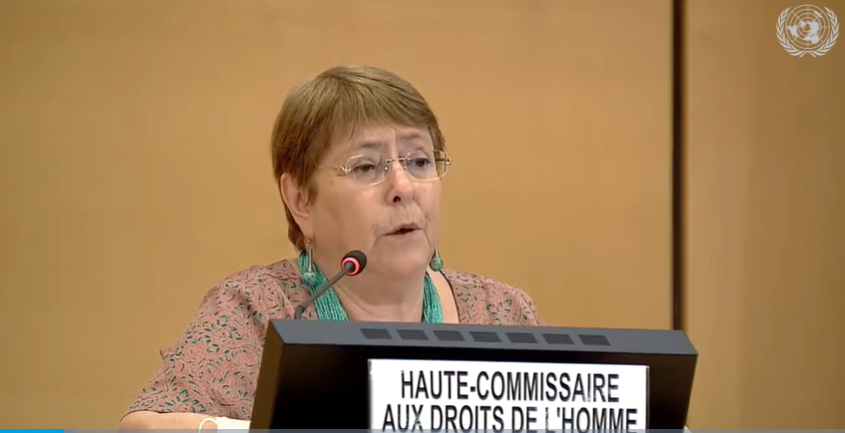High Commissioner Michelle Bachelet: “the health crisis caused by COVID-19 has led to greater restrictions on civic and democratic space” in Nicaragua
Geneva, July 2nd, 2020. The health crisis caused by COVID-19 has led to greater restrictions on civic and democratic space in Nicaragua, according to an oral update given by United […]

Geneva, July 2nd, 2020. The health crisis caused by COVID-19 has led to greater restrictions on civic and democratic space in Nicaragua, according to an oral update given by United Nations High Commissioner for Human Rights Michelle Bachelet during the 44th period of sessions of the Human Rights Council.
“The official discourse stigmatizes people who criticize the State response or disseminate information contradicting official sources (…) There is also little transparency and lack of clarity in public information on cases. Although the Government has indicated that it has been working to strengthen public health and community health, visiting house to house to detect cases, some government measures do not comply with the recommendations of the WHO, PAHO and the Nicaraguan medical community, especially regarding physical distancing”, said the High Commissioner.
The Office of the High Commissioner has also received complaints from at least 16 doctors who have been dismissed, “without respect for legal procedures, for criticizing the State response to the pandemic.”
In addition, Bachelet highlighted the increase in violence against women that has resulted from the pandemic. In particular, 32 femicides were registered between January and May of this year, 5 more than the same period last year.
This update was given in fulfillment of the High Commissioner’s mandate under the recently approved resolution “Promotion and protection of human rights in Nicaragua” (A/HRC/43/L.35), which also calls for an oral update during the 45th period of sessions in September 2020 and a written report at the 46th period in March 2021.
As a reaction to the update, Nicaraguan Attorney General Wendy Carolina Morales referred to reports on the inadequate government response to the pandemic as “disinformation and hate campaigns,” insisting that a series of preventive measures were adopted to prepare the public health system for the arrival of the novel coronavirus. Morales also rejected the report of the High Commissioner and denounced resolution L.35 as “interventionist.”
Human rights violations
The High Commissioner also reported that since her last report to the Council on the situation in Nicaragua in February, “persistent human rights violations continue to be registered against those whom the Government perceives as opponents,” including human rights defenders, journalists, social leaders, and former political detainees.
According to the OHCHR, the right to peaceful assembly in Nicaragua continues to be systematically curtailed: between March and June this year, 43 complaints were reported regarding alleged human rights violations, house searches without a warrant, arbitrary arrests and detentions, threats, harassment, and intimidation by police or pro-government elements against people perceived as opponents.
Meanwhile, Bachelet warned that there are still no investigations or criminal proceedings to identify, prosecute, and punish those responsible for serious human rights violations over the past two years, a situation exacerbated by the Amnesty Law.
Attacks in rural areas
Another issue of concern to the OHCHR is deadly violence in Nicaragua’s rural areas. Bachelet mentioned the shootings that left four indigenous people dead and two wounded in the Tuahka territory, North Caribbean Coast Autonomous Region, on March 26 and 27; the violent incidents of April 19 and 20 on Ometepe Island, which left at least two residents and three policemen injured; and the killing of an opposition figure in Jinotega in March.
“This persistent impunity erodes confidence in the authorities, and together with the lack of legal and institutional reforms, increases the risk of new human rights violations,” said Bachelet.
She also noted that since 2018, the Government has canceled the legal personality of 10 civil society organizations without due process, affecting the right to freedom of association in the country. The most recent cancellation took place on June 25 against the Asociación de Hermanamiento Municipal (ASODHERMU), which performed social work in the city of Camoapa.
The High Commissioner also recommended the release of all those detained in the context of the protests for the past two years.
She also called on the Government to be more open to dialogue with civil society, as well as to cooperate with the United Nations and the Inter-American system. “This is essential to strengthen the response to the pandemic, implement consensual measures that contribute to overcoming the socio-political and human rights crisis, and prepare a fair and transparent electoral process.”
She concluded by urging the Human Rights Council to continue monitoring the situation.
Civil society
The International Federation for Human Rights (FIDH) and the Nicaraguan Center for Human Rights (CENIDH) participated in the Council’s debate after the oral update by the High Commissioner. “The secrecy which increases risk and uncertainty continues due to the great difference in the official figures. which indicate 83 [COVID-19] deaths, and those of the Citizen Observatory, which indicate 1,878 suspicious deaths, along with the threats and massive firings against medical personnel and lack of health protection in their work, due to which more than 40 have died,” indicated Sonia Tancic in representation of both organizations.

